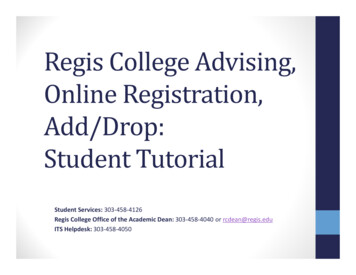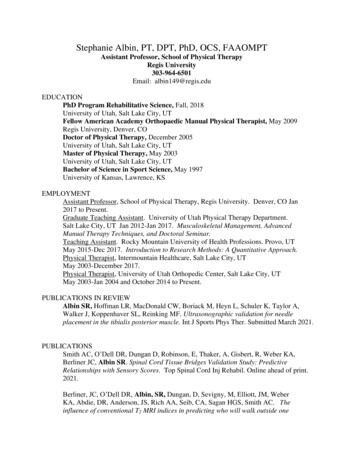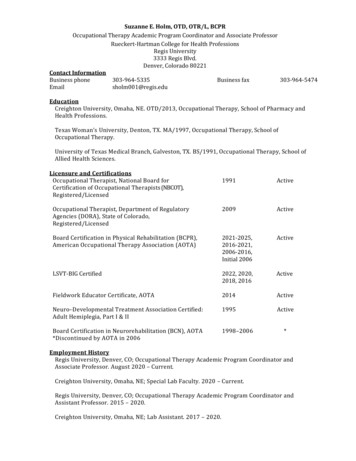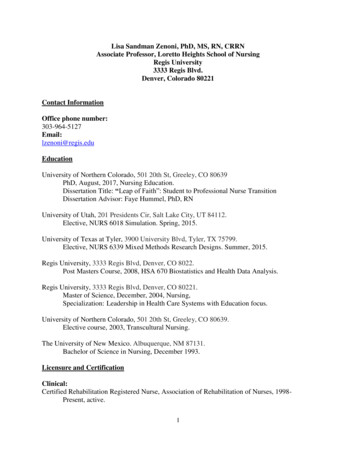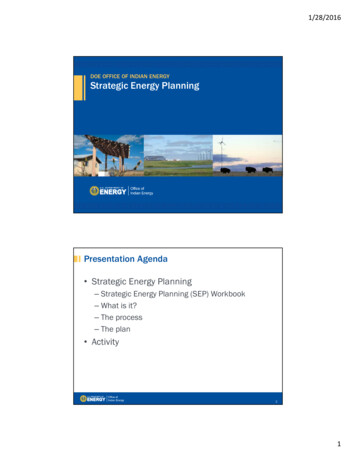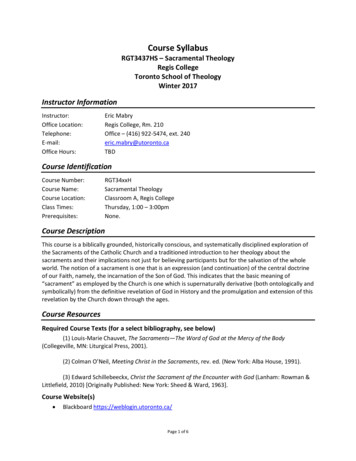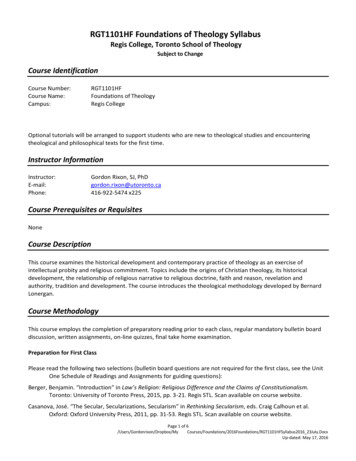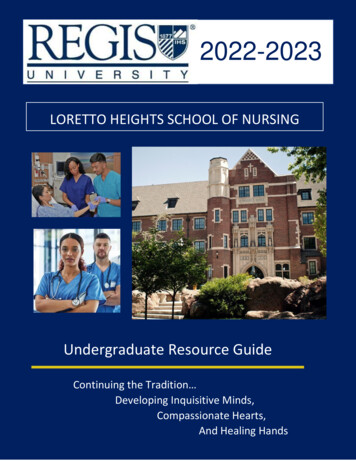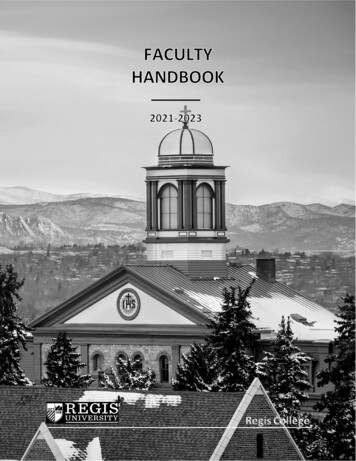
Transcription
Regis College
Presented by the Faculty Handbook Committee of the Regis CollegeFaculty Senate and the Dean of Regis College to contain policies,procedures, and resources for faculty.Faculty Handbook Committee Members 2020-2021 Academic YearMark Basham, Psychology & Neuroscience (Chair)Cristin Jensen Lasser, Division of EducationErin Winterrowd, Psychology & NeuroscienceErica Ferg (Ex Officio), School for Professional AdvancementRegis College Senate President 2020-2021 Academic YearLoretta Notareschi, Fine ArtsDean of Regis CollegeThomas Bowie
TABLE OF CONTENTSPREAMBLE. 8P.1 HISTORICAL CONTEXT . 8P.2 MISSION STATEMENT . 9P.3 ELEMENTS OF THE MISSION . 9P.4 DIVERSITY STATEMENT. 9P.5 REGIS UNIVERSITY CORE VALUES. 9P.6 THE REGIS NINE: OUR INSTITUTIONAL LEARNING OUTCOMES .10P.7 FACULTY VISION.11P.8 ACADEMIC FREEDOM AND PROFESSIONAL ETHICS .11P.9 DISCOURSE .14P.10 DEFINITIONS .14P.11. DAYS/DATES IN THIS HANDBOOK .19CHAPTER ONE: Regis University Administration and Academic Governance.191.1. Academic Senior Administration .191.1.1. The Provost and Deans .191.1.2. Non-Academic Senior Administration .191.2. Academic Governance .191.3. University-Wide Academic Committees .201.3.1. Regis University Academic Council (RUAC) .201.3.2. Institutional Review Boards for Human Subjects and Animal Research.201.3.3. University Research and Scholarship Council (URSC) .201.3.4. University Diversity Council .211.3.5. Ad Hoc University Academic Committees and Task Forces.211.4. Organizational Structure of Regis College.211.5. College Administrators.211.5.1. Dean.211.5.2. Academic and Faculty Administrators .221.5.3. Department Chairs in Regis College.221.5.4. Curricular Program Directors in Regis College .251.5.5. Administration and Representation of Divisions and Schools in Regis College .273
1.6. College Administrative Committees and Faculty Governance .281.6.1. Faculty Senate and Subcommittees .281.6.2. Committee on Rank and Tenure.301.6.3. Diversity Committee .321.6.4. Shared Governance through Committees, Councils & Boards .321.6.5. Consultation for Changes in Educational Program.321.6.6. Expectations for Regis College Faculty Participation in University Shared Governance .33CHAPTER TWO: Faculty Rights, Roles, and Responsibilities .342.1. Faculty Appointments .342.2. Types of Faculty .342.2.1. The Ranked Faculty.342.2.2. The Unranked and Honorary Faculty .362.3. Faculty Duties and Workload .412.3.1. Academic Work Year.412.3.2. Faculty Availability .412.3.3. On-Campus Presence .422.3.4. Office Hours .422.3.5. Advising and Student Relationships .432.3.6. Ranked Faculty Workload.442.3.7. Communication of Faculty Commitment that Impacts Overall Workload .552.3.8. Curriculum Course Offerings and Syllabi.552.3.9. Academic Schedules .562.3.10. Course Content.562.3.11. Cancellation of On-Campus Class Sessions.562.3.12. Inclement Weather.572.3.13. Final Examinations or Equivalent Assessments.572.3.14. Classes by Special Arrangement.572.3.15. Sale of Instructional Materials .572.3.16. Special Fees.582.3.17. Deadlines Related to Courses .582.3.18. Full-Time Faculty Members and Outside Employment and/or Business Interest .582.3.19. Political Advocacy .584
2.3.20. Adherence to University Regulations .592.4. Academic Integrity .592.5. Faculty Development, Support, and Honors.592.5.1. Faculty Professional Development .602.5.2. Office Facilities .612.5.3. Faculty Administrative Support.612.5.4. Faculty Honors: The Regis College Lecturer Award .622.6. Sabbatical and Other Leaves .622.6.1. Policies and Procedures on Sabbatical Leave .622.6.2. Paid and Unpaid Leaves of Absence .65CHAPTER THREE: Faculty Hiring, Files, Compensation, and Rank .683.1. Policies and Procedures for Recruiting and Hiring Faculty .683.1.1. Recruitment of Ranked Faculty .683.1.2. Appointment of Ranked Faculty.703.1.3. Appointment of Regis College Summer Session Faculty .713.1.4. Appointment of Academic Administrators and Academic Rank.713.1.5. Appointment of Unranked Faculty .723.1.6. Additional Considerations for Appointment of Affiliate Faculty.733.2. Official Faculty Files.733.2.1. Pre-Employment Records.743.2.2. Personnel File .743.2.3. The Employment Record File .743.2.4. The Academic Record File .753.3. Salaries and Benefits .763.3.1. Ranked Faculty Salaries .763.3.2. Ranked Faculty Benefits .773.3.3. Summer Session Salaries and Benefits .773.3.4. Unranked Faculty Salaries and Benefits .783.4. Determination of Initial Academic Rank.78CHAPTER FOUR: Review, Tenure, and Promotion .794.1. Schedule and Dates for Review, Tenure, and Promotion.794.1.1. Schedule of Ranked Faculty Review and Application for Promotion and/or Tenure .795
4.1.2. Dates Related to Review, Tenure, and Promotion .804.1.3. Information about the Review Process.824.2. Academic Rank Criteria.824.2.1. Assistant Professor .824.2.2. Associate Professor.834.2.3. Professor.834.3. Faculty Review and Reappointment .844.3.1. Criteria for Assessment .854.3.2. Review of the Regis College Ranked Faculty .904.3.3. Reappointment of Ranked Faculty .964.3.4. Review of the Regis College Unranked Faculty .964.4. Policies and Procedures on Tenure.974.4.1. Definition of Probationary/Tenure-Track and Tenured Status .984.4.2. Experience Required for Tenure .994.4.3. Request for Tenure . 1004.4.4. Academic Administrators and Tenure . 1004.4.5. Procedures for Advancement to Tenure . 1024.5. Policies and Procedures on Promotion . 1044.5.1. Education and Experience Required for Promotion . 1054.5.2. Request for Promotion. 1064.5.3. Rank and Promotion for Faculty Academic Administrators . 1074.5.4. Procedures for Promotion in Rank . 1074.6. Review, Tenure, and Promotion for non-Tenured, non-tenure-Track, Ranked Faculty Members. 1104.6.1. Schedule and Dates for Review, Tenure, and Promotion. 1104.6.1.1. Schedule of Review . 1104.6.1.2. Preparation and Schedule for Application for Tenure. 1114.6.1.3. Dates Related to Review. 1124.6.2. Academic Rank Criteria . 1134.6.2.1. Assistant Professor (Non-Tenure Track). 1134.6.2.1. Associate Professor (Untenured) . 1134.6.2.1. Professor (Untenured) . 1146
4.6.3. Faculty Review and Reappointment . 1144.6.3.1. Criteria for Assessment . 1144.6.3.2. Review of the Ranked Non-Tenure-Track and Untenured Faculty . 1144.6.3.3. Reappointment of Ranked Faculty. 1154.6.4. Policies and Procedures on Tenure . 1154.6.5. Policies and Procedures on Promotion. 115CHAPTER FIVE: Separation from Employment . 1165.1. Resignation. 1165.2. Retirement . 1165.2.1. Status and Privileges of Retired Faculty Members. 1165.2.2. Gradual Retirement Program. 1175.3. Individualized Separation Arrangements . 1185.4. Dismissal . 1185.5. Layoff . 1195.5.1. Changes in Educational Program. 1195.5.2. Financial Exigency . 1205.6. Non-Reappointment . 1205.7. Temporary Suspension from Duties . 122CHAPTER SIX: Review and Grievance Procedures . 1236.1. Definitions. 1236.2. General Provisions Governing Grievances. 1236.3. Dismissal, Suspension, Reassignment, or Layoff . 1246.4. Procedure for Handling Grievances . 124CHAPTER SEVEN: Faculty Handbook Revisions . 1287.1. Handbook Revision Process . 128APPENDIX I. Summary Tables of Selected Dates and Deadlines . 1317
PREAMBLEThis document shall serve as the Faculty Handbook for Regis College. Definitions, policies, andprocedures specified in this handbook supersede any previous versions of this handbook. In the eventthere is a conflict between the Faculty Handbook and the Human Resources Policy Manual, the FacultyHandbook shall govern. Regis University is an institution of higher learning operating in the AmericanJesuit Catholic tradition. Both as an organization and as a learning community, Regis Universityconstantly strives to advance its mission of educating leaders in the service of others. Together, membersof the University seek to inspire students and each other to discern, carefully and critically, answers tothe life-enriching question: “How ought we to live?”Teaching, scholarship, service, and cura personalis--the care and concern for the whole person--arerecognized as constituting essential elements of the existence of Regis University. In Regis College,these activities are carried out in the service of liberal arts education and the Jesuit educational mission.Regis College is a college devoted to the studies of the liberal arts and sciences, serving primarily atraditional undergraduate population but also a growing number of graduate students. The primary aimsfor a college of liberal arts and sciences are to pursue truth and to expand the body of human knowledge.These aims are also highly valued within a Jesuit context, for broadening human knowledge and seekingtruth are ways of enacting the Jesuit pursuit of finding God in all things. Best practices for a college ofliberal arts and sciences are those that best allow its faculty to fulfill its mission and purpose. Suchpractices must include those that preserve academic freedom, which is the principle governing theunfettered pursuit of truth in academic practices of teaching and scholarship.As members of the academic profession, liberal arts and sciences faculty members must govern andregulate themselves so that they can do what they do best: namely, to teach and to engage in scholarshipin the pursuit of truth. Best practices require the development and maintenance of practices which fosterthe teaching, scholarship, and self-governance integral to the academic profession. Tenure is essentialto maintain academic freedom as well as to provide a formative structure in which faculty members candevelop the interior freedom necessary for professional and academic discernment. Self -governance isessential both as an element of academic professionalism and as an instantiation of the principle ofsubsidiarity, found in Catholic social teaching, according to which matters ought to be determined bythe least centralized competent authority. As members of a self-governing academic profession, facultymembers must review each other and recommend tenure and promotion decisions for each other.Moreover, self-governance requires that faculty members set the criteria for good performance andestablish the specific rights and responsibilities entailed by their profession (and by its goal of the pursuitof truth through teaching and scholarship), as suitable to their specific institution. Faculty members musttherefore share in various systems of self-governance, including participation in an active Faculty Senateand power in making changes to the Faculty Handbook.P.1 HISTORICAL CONTEXTRegis University as a Jesuit institution is the recipient of a rich history of broad instruction, dialogue,and disputation among students and among faculty that began in the 1500s (see The Constitutions of theSociety of Jesus, 1548). This context continues to shape our institutional mission and our perspective asfaculty.8
P.2 MISSION STATEMENTAs a Jesuit Catholic university, Regis seeks to build a more just and humane world throughtransformative education at the frontiers of faith, reason and culture.P.3 ELEMENTS OF THE MISSION As a university, Regis draws from wellsprings of ancient wisdom and explores new horizons ofthought and imagination to pursue truth, strive for justice, and cultivate beauty. In everything,Regis shepherds the development of the whole person in relation to the common good, asking,“How ought we to live?” As Catholic, part of a global community of faith called to celebrate and embody God’s love in theworld, Regis educates diverse students for lives of service and meaning, equips them withknowledge and skills to be discerning persons in solidarity with others, especially all who are pooror whose dignity has been violated, and empowers them to care for the Earth, our common home. As Jesuit, rooted in an Ignatian spirituality of Christian discipleship and open to the sacred in allhuman cultures, Regis aspires to be a community of learners who labor for a transformed worldand renewed ecosystem, and who journey as companions, responsible to each other.P.4 DIVERSITY STATEMENTRegis College recognizes that the work of diversity, equity, and inclusive excellence is all our work.Such work is at the heart of our Jesuit values, and in Regis College, we are committed to our Jesuitprinciples of standing with the marginalized, upholding the sacred dignity of all individuals, andassuming the responsibility for the long, hard work of shaping an inclusive community where students,staff, faculty, administration, and every one of our colleagues can flourish. We acknowledge thatobtaining excellence in diversity, equity, and inclusive excellence nourishes the entirety of RegisCollege.P.5 REGIS UNIVERSITY CORE VALUES1. A shared commitment to our Jesuit, Catholic Tradition, which values the liberal arts and academicrigor as the foundation of all education and professions, and that honors faith, reason, and academicfreedom in the search for truth, knowledge, and wisdom;2. Transformation of learners through Experience, Reflection, and Action in the context of Creativity andDiscernment, affecting all facets of the human person—intellectually, spiritually, socially, ethically, andphysically;3. An Inclusive and Welcoming Learning Community that mirrors the world; transcends the interests ofparticular individuals or groups; values reasoned, respectful discourse in decision making; promotes thefree exchange of ideas; and respects the contributions and views of others;4. A Commitment to Justice and the Common Good, that demonstrates an unwavering belief in humandignity, examines our relationships with all of God’s creation, and forms globally informed students whowill “move the world” as leaders in the service of others;9
5. Careful Stewardship of our mission, our community, and our resources in order to build a sustainablefuture for the university.P.6 THE REGIS NINE: OUR INSTITUTIONAL LEARNING OUTCOMESThe Regis Nine are Regis University’s institution-wide learning outcomes. We are committed to thesenine outcomes as an ideal in the formation and education of our students.The Regis Nine encompass the knowledge, skills, and values that we believe are fundamental tothe personal and professional growth of our students, employees, and community.At Regis University, we seek to educate the whole person (cura personalis) in three important ways:teaching academic content (knowledge-based learning), developing practical skills and abilities for usein the "real world" (skill-based learning), and instilling a commitment to leadership, service, and ethicaland social responsibility (values-based education).We expect students to exhibit the Regis Nine at an appropriate level throughout their academic andextracurricular endeavors at Regis University.Similarly, continuous quality improvement efforts in our administrative and academic support units arereflective of the extent to which employees have integrated the Regis Nine in their daily work.KnowledgeKnowledge of a discipline or content areaKnowledge of diverse cultures, perspectives, and belief systemsKnowledge of arts, sciences, and humanitiesSkillsAbility to think criticallyAbility to communicate effectivelyAbility to use contemporary technologyValuesCommitment to ethical and social responsibilityCommitment to leadership and service to othersCommitment to learning as a lifelong endeavorThe Regis Nine involve a combination of knowledge, skills, and values; each is important. In the RegisUniversity educational model, a person’s commitment to ethical and social responsibility is equal invalue to that person’s knowledge and skills.10
P.7 FACULTY VISIONThe mission of Regis University requires the diligence and engagement of excellent faculty memberswho are continuously present to lead the planning, instruction, and assessment of subjects taught withinthe institution. These capable and learned masters in the classical and contemporary disciplines hold thepower of knowledge and devote their professional lives to guiding others in the pursuit of truth andknowledge.As masters, they hold the personal, academic, and professional growth and development of their studentsas a highest priority, and they require of learners demonstrable evidence of their lessons. Facultymembers promote the vitality of the various disciplines through their scholarship, research, and service.They create and foster the intellectual life of the University and its members. The University bestowsupon its faculty members the authority and privilege of their rank and profession. Faculty members’responsibilities to the institution and its students are central to the intellectual exercises of the institution;thus, the faculty participates in the governance of the University.P.8 ACADEMIC FREEDOM AND PROFESSIONAL ETHICSRegis University affirms and is guided by the ideal that all members of the faculty, whether tenured ornot, are entitled to academic freedom as set forth in the 1940 “Statement of Principles on AcademicFreedom and Tenure” jointly formulated by the American Association of University Professors and theAssociation of American Universities as reissued in 1990.Specifically, the following excerpts from the 1940 Statement, as reworded in 1990, define what is meantby academic freedom.“Institutions of higher education are conducted for the common good and not to further theinterests of either the individual teacher or the institution as a whole. The common good dependsupon the free search for truth and its free exposition.“Academic freedom is essential to these purposes and applies to both teaching and research.Freedom in research is fundamental to the advancement of truth. Academic freedom in itsteaching aspect is fundamental for the protection of the rights of the teacher in teaching and ofthe student to freedom in learning. It carries duties correlative with rights.“(a) Teachers are entitled to full freedom in research and in the
there is a conflict between the Faculty Handbook and the Human Resources Policy Manual, the Faculty Handbook shall govern. Regis University is an institution of higher learning operating in the American Jesuit Catholic tradition. Both as an organization and as a learning community, Regis University

